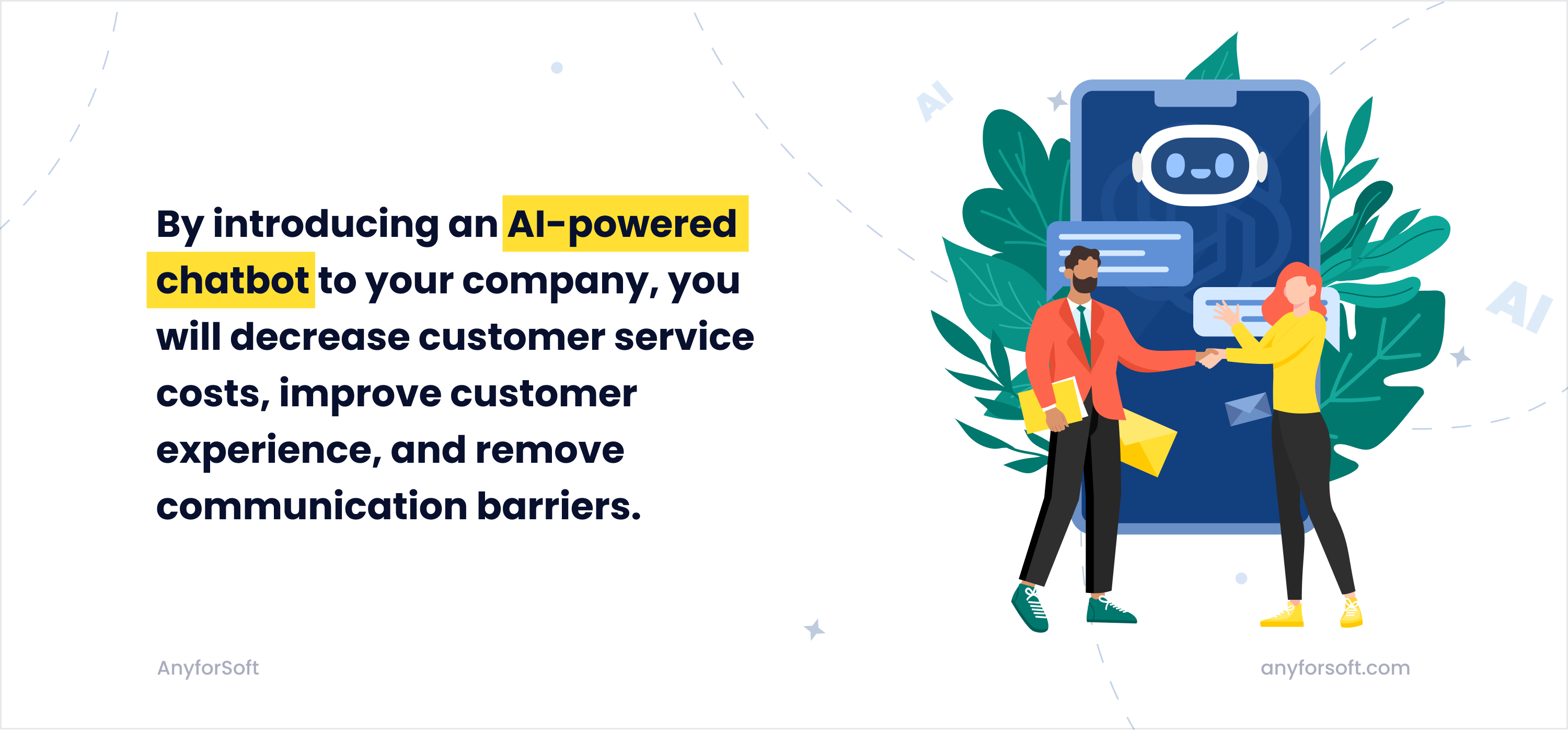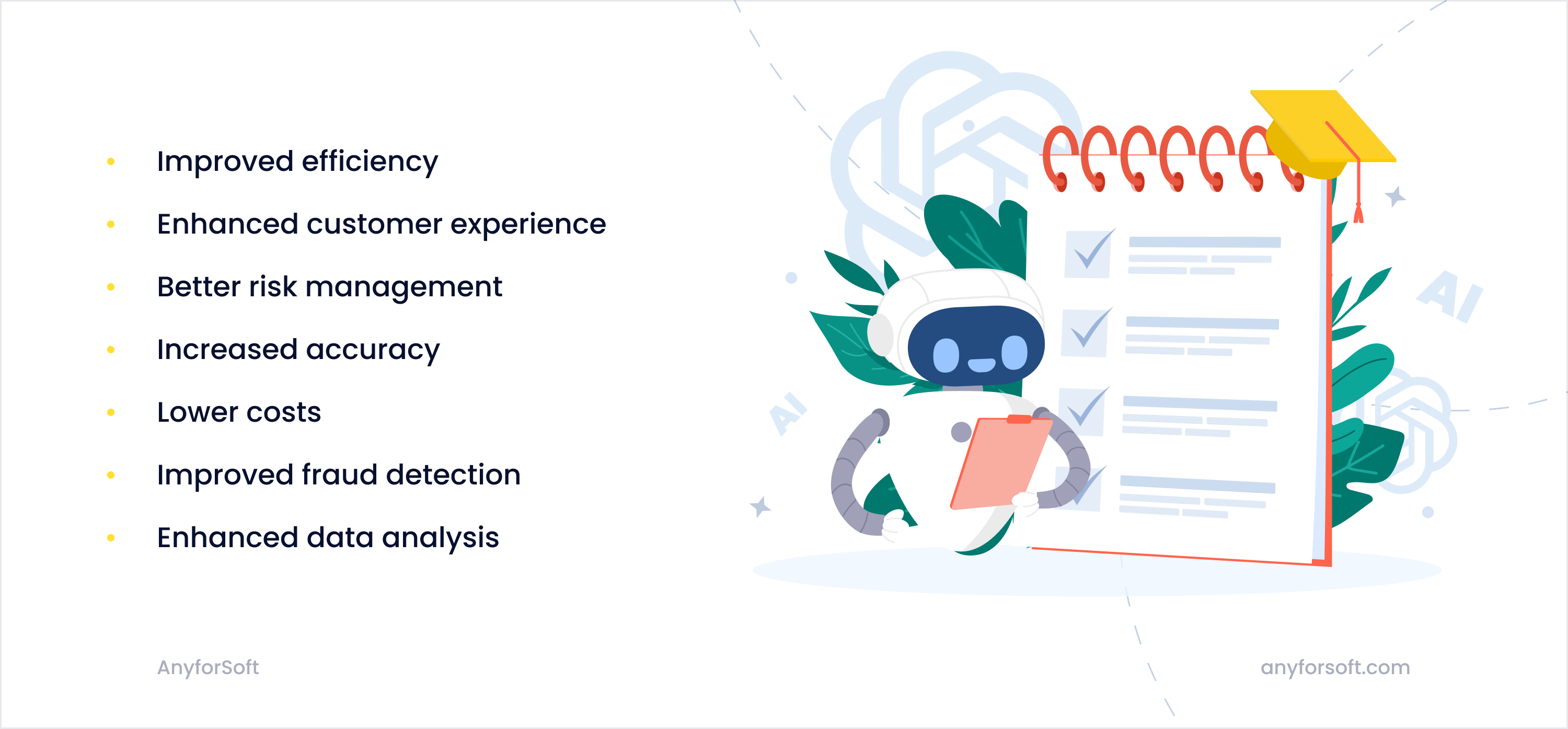Artificial intelligence (AI) is one of the most powerful technologies that benefits many industries. When it comes to fintech, it has proven to be a highly valuable tool. AI has revolutionized the industry, enabling thousands of financial organizations and fintech companies to automate labor-intensive operations, streamline processes, and make well-informed decisions.
As a company that specializes in fintech development services, AnyforSoft would like to elaborate on the role of AI in fintech. In the following paragraphs, we discuss how artificial intelligence helps companies in the fintech sector better cope with their daily routines while minimizing expenses.
Who knows, maybe this article will encourage you to implement AI in your own company’s operations.
AI in FinTech Industry: Market Size
Before describing the use cases, let’s first learn how widespread AI technology is in the financial industry. According to Allied Market Research, the global market size of artificial intelligence in fintech was valued at $8.23 billion in 2021 and is expected to reach $61.30 billion by 2031, growing at 22.5% each year. Thus, AI-powered solutions are firmly embedded in the financial sector, and this tendency will only increase. That means if you want to compete properly, you will have to implement AI technologies at some point.
While it may seem expensive, the implementation of artificial intelligence will benefit your organization in multiple ways.
AI in FinTech: Top 5 Reasons to Leverage Artificial Intelligence
Why embrace fintech AI?
Well, there are many reasons.
AI applications in fintech help companies improve while minimizing their expenses. In order not to be unfounded, let us show 5 real use cases of the technology in the fintech industry.
#1 Better customer service with AI-powered chatbots

The more clients you have, the harder it is to provide quality customer support and service. At some point, your team will be insufficient to resolve your clients’ issues in a timely manner. As a result, they will have to wait hours to have their questions answered.
That is unacceptable for any customer-oriented company.
Luckily, there is a fast way to tackle this issue—AI chatbots.
An AI chatbot can communicate with thousands of users simultaneously while being available 24/7. It will help you reduce the workload of your customer service team and minimize expenses. What you could do is have a chatbot to answer simple and repetitive customer questions while your human team will be dealing with more complex inquiries.
By introducing an AI-powered chatbot to your company, you can:
- Reduce customer service costs. Instead of hiring more employees to provide customer support via chat, it is more prudent to invest in an AI-powered system that will do the same work for free.
- Improve customer experience. With a chatbot, your client can get an answer to their question in less than five seconds (no customer support team replies that fast).
- Remove interpersonal communication barriers. Shy individuals are often afraid to bother a “real” customer support manager. With virtual assistants, the fear is completely gone.
As you can see, AI in fintech is a great instrument for improving customer service.
#2 Improved Fraud Detection and Prevention
Another use case of AI for fintech is fraud detection and prevention. Big fintech companies process thousands of transactions every day. Obviously, analyzing each transaction for suspicious activities manually is virtually impossible. Thanks to artificial intelligence and machine learning, however, financial institutions are able to identify fraudulent activity in real time, reducing the teams’ workload and automating labor-intensive tasks.
What’s more, AI algorithms are more accurate—they can analyze significant amounts of data and identify fraudulent activity patterns way better than humans. In addition to that, they can work non-stop and automatically flag suspicious financial transactions for further investigation. This allows financial institutions to respond quickly to potential fraud and take action to prevent it from occurring.
#3 More accurate credit scoring
When assessing creditworthiness, traditional scoring models rely on limited data: payment history, outstanding debt, credit history length, and so on. While these models are still effective, they often limit individuals who, say, don’t have a credit history or have non-traditional sources of income.
AI models, on the other hand, are able to analyze larger volumes of data (including non-traditional data sources), which helps financial institutions create more accurate credit scores and adequately assess a borrower’s creditworthiness. This expands access to credit, increasing the organization’s income.
What’s more, AI and ML models are efficient. They automate various aspects of the lending process, eliminating the need for manual underwriting. This improves operational efficiency, resulting in more accurate and faster loan decisions. Thus, by investing in AI-based software for scoring, you will offer a better borrower experience.
#4 Enhanced financial security

According to IBM, 20% of data breaches are caused by compromised credentials. What’s even more shocking is that it can take an average of 287 days for a financial organization to identify and respond to a data breach. Just picture it: someone stole your money, and you have to wait for almost 300 days before your issue is resolved.
Pretty frustrating, isn’t it?
In order to prevent such an experience for your customers, you should consider adopting AI, or more specifically, AI-powered security solutions.
You see, username and password authentication is not a great option for financial companies to protect customer data. Sometimes it takes a simple brute force tool to access a person’s personal account. What’s better security-wise though, is biometric authentication, such as facial recognition, iris scanning, fingerprint identification, and voice verification.
Take facial recognition systems, for example. AI-powered systems are sophisticated and smart to such an extent that they can recognize your face in various conditions and even if you’ve gained weight or grown a beard. Thus, when it comes to cyber security, artificial intelligence in fintech applications is a must-have for every client-oriented company.
#5 Risk management and informed investment decisions
AI algorithms can analyze market data and identify potential risks, enabling financial organizations and fintech companies to make informed investment decisions. This includes analyzing macroeconomic data, news articles, social media sentiment, and other relevant data sources to detect emerging risks and trends.
Unlike humans, AI systems monitor critical data in real time and round the clock, looking for good investment opportunities. This can potentially help your company prosper.
AI and Fintech: Benefits for Organizations

Now that we described the use cases for AI in fintech, let’s summarize the benefits that artificial intelligence brings to companies:
- Improved efficiency. How AI will help fintech companies? First of all, AI-powered systems automate labor-intensive tasks, allowing organizations to operate more efficiently and with fewer errors. This includes tasks such as data processing and customer service.
- Enhanced customer experience. AI improves the customer experience by providing personalized recommendations, automating routine inquiries, and offering 24/7 customer support via chat.
- Better risk management. AI-based fintech solutions help companies identify and manage risks more effectively by analyzing vast amounts of data and detecting patterns that might not be apparent to human analysts.
- Increased accuracy. AI fintech tools analyze data much more quickly and accurately than humans, reducing errors and improving decision-making.
- Lower costs. By automating routine tasks and improving efficiency, AI help fintech companies reduce costs. For example, you can implement an AI-based chatbot and reduce customer support costs.
- Improved fraud detection. AI helps financial companies detect and prevent fraud by analyzing transactional data and identifying patterns of behavior that are indicative of fraudulent activity.
- Enhanced data analysis. AI-based systems are able to analyze vast amounts of data in real time, providing insights that will help companies in the financial services industry of the banking sector make more informed business decisions.
The Role of Artificial Intelligence in FinTech: Conclusion
Fintech and AI go hand in hand. Fintech apps help companies streamline their workflows, automate processes, improve decision-making accuracy, and, of course, decrease costs. Various reports show that AI and machine learning are heavily adopted by many financial companies, big and small. And if you want to stay afloat in this competitive market, you should consider implementing artificial intelligence yourself.
As a company that offers fintech software development services, AnyforSoft can help. Over 11 years of development experience allows us to create solutions of any complexity. Just contact us and we will help you translate your idea into a successful product.
AI is crucial for the fintech industry for multiple reasons. First of all, it helps automate labor-intensive processes, such as customer data processing, for example. Secondly, when it comes to fintech, artificial intelligence can help financial institutions decrease costs. And, of course, AI systems are very good at data analysis, so they help make more informed decisions on investments, crediting, and so on.
AI is crucial for the fintech industry for multiple reasons. First of all, it helps automate labor-intensive processes, such as customer data processing, for example. Secondly, when it comes to fintech, artificial intelligence can help financial institutions decrease costs. And, of course, AI systems are very good at data analysis, so they help make more informed decisions on investments, crediting, and so on.
Digital banking, regtech, insurtech, and robo-advisors are perfect examples of niches that rely heavily on artificial intelligence and machine learning. With the advent of AI-powered chatbots, the customer service niche also benefits from artificial intelligence implementation.
Digital banking, regtech, insurtech, and robo-advisors are perfect examples of niches that rely heavily on artificial intelligence and machine learning. With the advent of AI-powered chatbots, the customer service niche also benefits from artificial intelligence implementation.
Machine learning is a type of artificial intelligence that allows software applications to become more accurate at predicting outcomes without being explicitly programmed to do so. Machine learning algorithms use historical data as input to predict new output values. For example, ML is often leveraged in facial recognition systems and product recommendation algorithms so that they can gradually improve.
Machine learning is a type of artificial intelligence that allows software applications to become more accurate at predicting outcomes without being explicitly programmed to do so. Machine learning algorithms use historical data as input to predict new output values. For example, ML is often leveraged in facial recognition systems and product recommendation algorithms so that they can gradually improve.
